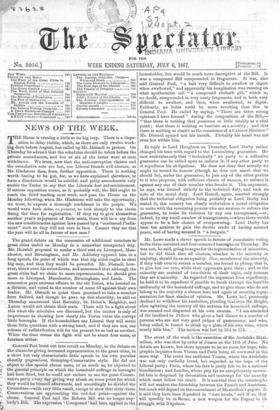In reply to Lord Houghton on Thursday, Lord Derby rather
changed his tone with regard to the Luxemburg guarantee. He now maintains only that " technically" no party to a collective guarantee can be called upon to enforce it, if any other party to it repudiates his obligations. He does not deny that morally we might be bound in honour (though he does not assert that we should be), under the guarantee, to join any of the other parties to it who proposes, with sufficient chance of success, to enforce it against any one of their number who breaks it. This argument, he says, was limited strictly to the technical duty, and took no note of the moral duty. Lord Russell, again, asserted strongly that the technical obligation being probably as Lord Derby had stated it, this country has clearly undertaken a moral obligation to unite with the remaining powers who are anxious to enforce the guarantee, to resist its violation by any one trausgressor,—or, indeed, by any small number of transgresiors,=whom there would appear to be a fair chance of overpowering. Lord Derby has been too anxious to gain the double credit of having secured peace, and of having secured it " a bargain."






























